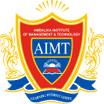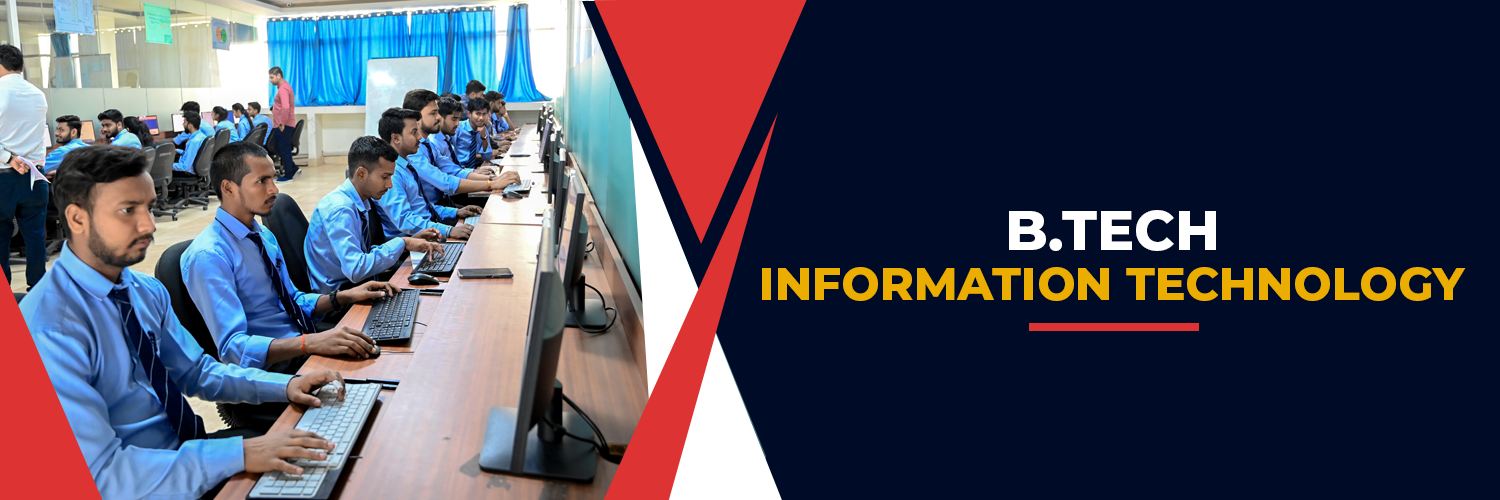![]() Ambalika Institute of Management and Technology offers an undergraduate program in Information Technology, specifically, B. Tech Information Technology. It is the best IT course in Lucknowaffiliated to AKTU and follows the eight semester structure prescribed by it.
Ambalika Institute of Management and Technology offers an undergraduate program in Information Technology, specifically, B. Tech Information Technology. It is the best IT course in Lucknowaffiliated to AKTU and follows the eight semester structure prescribed by it.
A bachelor’s degree in Information Technology (B. Tech Information Technology) ) is a four-year undergraduate degree combining hardware management, software development, networking, software administration, and network security.Since its inception in 2008, the Department of Information. Technology at AIMT has been committed to delivering top-tier education and training in the IT field. Over the years, the department has grown significantly, contributing to technological advancements and knowledge transfer.
Information Technology is crucial in today’s world, involving the use of computers and software for efficient information management. Our department covers a wide range of areas including computer hardware, software, telecommunications, and digital media. This comprehensive approach prepares students for various career paths, as IT is essential across numerous industries such as business, government, healthcare, and education.
At AIMT, we focus on practical, hands-on learning, ensuring our students are equipped with the skills needed to succeed in the fast-paced IT industry. Our curriculum blends theoretical knowledge with real-world applications, guided by experienced faculty who are experts in their fields. We provide a supportive learning environment that fosters creativity, critical thinking, and collaboration.
Students have access to cutting-edge facilities and technology, allowing them to explore new technologies and tackle real-world challenges. We also emphasize strong industry connections, offering internships, guest lectures, and industry-driven projects to enhance students’ employability and industry readiness.
Whether you aim to become a software developer, network engineer, data analyst, or IT manager, AIMT’s Department of Information Technology provides a solid foundation for a successful career in this dynamic field. Join us and start your journey towards making a meaningful impact in the world of technology!
Program Educational Outcomes
PEO 1: To prepare our students to find suitable employment commensurate with their qualification.
PEO 2: To create good entrepreneurs who may contribute to the nation building and generate job opportunities for others.
PEO 3: To develop proficiency in students for higher studies and R & D for the solution of complex problems for betterment of the society.
PEO 4: To develop students as responsible citizens with high moral and ethical values who can become asset to a vibrant nation.
Program Outcomes
PO 1: Engineering Knowledge: Apply the knowledge of mathematics, science, engineering fundamentals, and an engineering specialization to the solution of complex engineering problems.
PO 2: Problem Analysis: Identify, formulate, review research literature, and analyze complex engineering problems reaching substantiated conclusions using first principles of mathematics, natural sciences, and engineering sciences.
PO 3: Design/development of solutions: Design solutions for complex engineering problems and design system components or processes that meet the specified needs with appropriate consideration for the public health and safety, and the cultural, societal, and environmental considerations.
PO 4: Conduct investigations of complex problems: Use research-based knowledge and research methods including design of experiments, analysis and interpretation of data, and synthesis of the information to provide valid conclusions
PO 5: Modern tool usage: Create, select, and apply appropriate techniques, resources, and modern engineering and IT tools including prediction and modeling to complex engineering activities with an understanding of the limitations.
PO 6: The engineer and society: Apply reasoning informed by the contextual knowledge to assess societal, health, safety, legal and cultural issues and the consequent responsibilities relevant to the professional engineering practice.
PO 7: Environment and sustainability: Understand the impact of the professional engineering solutions in societal and environmental contexts, and demonstrate the knowledge of, and need for sustainable development.
PO 8: Ethics: Apply ethical principles and commit to professional ethics and responsibilities and norms of the engineering practice
PO 9: Individual and team work: Function effectively as an individual, and as a member or leader in diverse teams, and in multidisciplinary settings.
PO 10: Communication: Communicate effectively on complex engineering activities with the engineering community and with society at large, such as, being able to comprehend and write effective reports and design documentation, make effective presentations, and give and receive clear instructions.
PO 11: Project management and finance: Demonstrate knowledge and understanding of the engineering and management principles and apply these to one’s own work, as a member and leader in a team, to manage projects and in multidisciplinary environments.
PO 12: Life-long learning: Recognize the need for, and have the preparation and ability to engage in independent and life-long learning in the broadest context of technological change.
Program Specific Outcomes
PSO 1: Professional Skills: Attain the ability to design and develop hardware and software based systems, evaluate and recognize potential risks and provide creative solutions.
PSO 2: Successful Career and Entrepreneurship: Gain knowledge in diverse areas of IT and experience an environment conducive in cultivating skills for successful career, entrepreneurship and higher studies.
PSO 3: Demonstrate knowledge and understanding of the engineering and management principles and apply these to one’s own work, as a member and leader in a team, to manage projects and in multidisciplinary environments.


